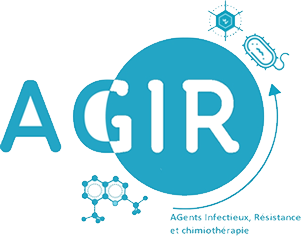Mycobacteria
You are here : Accueil > Programmes de recherche > Mycobactéries
Tuberculosis (TB), mainly caused by the aerobic mycobacterium Mycobacterium tuberculosis (Mtb) or Koch's bacillus and by other mycobacteria closely related to it (nontuberculous mycobacteria or NTM) is ranked as the second most deadly infectious disease after HIV (Human Immunodeficiency Virus). Tuberculous or non-tuberculous mycobacterial infections are a real public health problem. According to the World Health Organization (WHO), almost a third of the world's population has contracted latent TB and one in ten infected people is likely to develop TB. In 2011, almost 8.7 million new cases of TB were reported and 1.4 million people died. African and Asian countries have the highest frequencies of TB. Even if the incidence of pulmonary TB in France is low (8 cases per 100,000 people per year), the number of cases of multi- and extra-drug-resistant TB (MDR-TB and XDR-TB) is clearly increasing. For many of these patients, treatment options are limited and there is an urgent need for new antibiotics. Non-tuberculous mycobacterial infections (mainly M. avium and M. intracellulare, but also M. xenopi, M. abscessus and M. kansasii) are caused by environmental germs (water, aerosols). These are pulmonary, cutaneous or lymphatic infections in immunocompetent subjects or disseminated infections in immunocompromised subjects, the incidence of which is increasing. For countries like France, they become more problematic than multisensitive TB because they occur in patients with many comorbidities (such as chronic obstructive pulmonary disease or COPD) and unfortunately there are few or no effective treatments. Thus, our team is currently working on the design, synthesis and biological evaluation of new antituberculosis agents.
The evaluation of the antituberculosis activity of the synthesized molecules (heterocyclic derivatives and/or PAM) is carried out in vitro on sensitive (M. bovis DSM 43990, M. smegmatis DSM 43465) or multiresistant (M. bohemicum DSM 44277) strains of mycobacteria. ) to conventional anti-tuberculosis drugs, either in the rapid replication phase or in the quiescent phase, but also on ATCC strains of mycobacteria frequently encountered in France such as M. avium and M. xenopi (MAC 101 and M. xenopi ATCC 19971). For the most active molecules in vitro, additional studies will be carried out ex vivo, then in vivo on mouse models of non-tuberculous mycobacterial infections.
The evaluation of the antituberculosis activity of the synthesized molecules (heterocyclic derivatives and/or PAM) is carried out in vitro on sensitive (M. bovis DSM 43990, M. smegmatis DSM 43465) or multiresistant (M. bohemicum DSM 44277) strains of mycobacteria. ) to conventional anti-tuberculosis drugs, either in the rapid replication phase or in the quiescent phase, but also on ATCC strains of mycobacteria frequently encountered in France such as M. avium and M. xenopi (MAC 101 and M. xenopi ATCC 19971). For the most active molecules in vitro, additional studies will be carried out ex vivo, then in vivo on mouse models of non-tuberculous mycobacterial infections.



